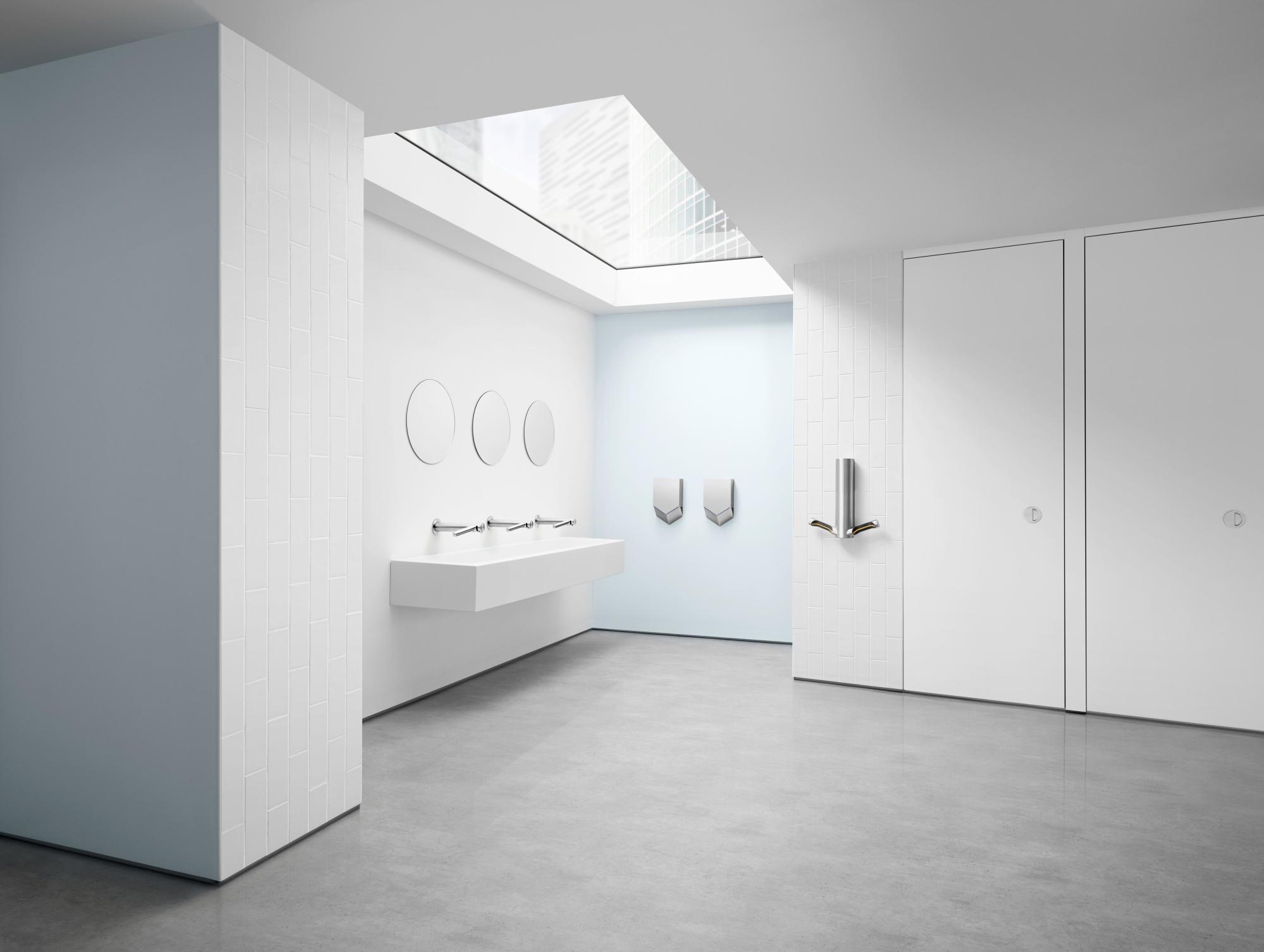Public Toilets – What Makes a Great Washroom User Experience?
New research shows the components of a "five-star washroom user experience." Excel Dryer UK recently conducted research into what the general public are...
Read Full Article
Sustainability and hygiene are key considerations for businesses looking to keep their public washrooms clean and welcoming for users. Dr Salomé Giao, Lead Scientist at Dyson for Business, discusses how technology plays a vital role in creating the washroom of the future.
Dr Salomé Giao is a microbiologist and a Research Fellow within Biological Sciences at the University of Southampton.

Picture: a photograph of Dr Salomé Giao
Smart technologies will play a key role in helping washroom managers meet consumer expectations and achieve business objectives around hygiene, sustainability, and design. In many instances, this role is already being fulfilled.
There are three big factors in washroom management: hygiene, which sits firmly within a user’s expectations; cost efficiency as a business objective; and sustainability, which is of ever-growing importance to both parties.
The hand-drying solutions often found in washrooms can have a big bearing on all three factors. Yet the two common options in many washrooms today are often inadequate at meeting these objectives. They are often outdated hand dryers – which have a poor hygiene and energy performance – and paper towels – which take a huge toll on the environment.
Smart hand drying technologies are engineered to have a positive impact on all three key factors: they bring the highest levels of hygiene to the washroom, enhanced environmental sustainability, and long-term cost efficiency. Their use will see washrooms become cleaner, more hygienic, and more eco-friendly spaces that the public is comfortable using, and far less resource-intensive for washroom managers.
The most exciting, most innovative washroom technologies of the future will be those that address key washroom challenges faced by both users and facilities managers through a single solution.
In many ways, that future is already here. Combined solutions, such as technologies that automatically switch between water and air allow users to wash and dry their hands seamlessly. They eradicate the need to touch multiple taps and buttons, and minimise the potential spread of airborne particles. And washroom users seem already well aware of the benefits these technologies offer: of the people who don’t wash their hands frequently, 32 per cent said they would be more likely to wash their hands more often if there was a hand dryer integrated with the sink.
On top of hygiene and ease of use, these combined solutions also have very clear sustainability and cost-efficiency credentials. For example, the Dyson Airblade Wash+Dry hand dryer has a lower environmental impact than other hand drying methods – producing 3.6g of CO2 per dry – and costing up to 76 per cent less to run than other hand dryers.
Combined solutions also have the added benefits of easing congestion in busy washrooms by enabling users to wash and dry their hands in less time without moving, enhancing washroom safety: users no longer have to walk across the washroom with wet hands before they dry.
"Paper towels are a common way to dry hands, yet they come with significant sustainability concerns. Millions of tonnes of paper towels are used every year, which is made possible by mass deforestation, and they produce huge volumes of waste since used paper towels cannot be recycled. Near the beginning of the supply chain, large volumes of water and chemicals are required to produce the end product. From start to finish, it is a practice that has serious environmental consequences."
The washrooms of the future will use technologies that are designed and engineered around key user demands.
Taking hygiene as an example, recent findings tell us that the key features the public are looking for in hand drying are touchless activation, hygienic surfaces that kill bacteria and viruses, and air-purifying filters. Touchless activation would reassure 59 per cent of the public when using a hand dryer, hygiene surfaces would reassure 42 per cent, while air purifying filters would make 39 per cent feel more confident when using public washroom amenities.
At Dyson, we’re already incorporating all three key user demands into the design of our hand dryers, and have been for some time. Dyson hand dryers are sensor-operated so touch-free, and use embedded HEPA filtration to purify the air they circulate. Our hand dryers are also made with an antibacterial and antiviral additive applied on their surface to reduce the spread of bacteria and viruses.
Many washroom facilities persist with hand drying solutions that are contributors to waste.
Consumers are becoming more environmentally aware as the conversation around the climate crisis intensifies, and this has changed their expectations of the products they consume and the technologies they use. As a result, many are aware of the environmental issues that come with commonly used hand drying solutions: 75% of the public say they are concerned about the common use of disposable and single-use consumables, such as paper towels.
Paper towels are a common way to dry hands, yet they come with significant sustainability concerns. Millions of tonnes of paper towels are used every year, which is made possible by mass deforestation, and they produce huge volumes of waste since used paper towels cannot be recycled. Near the beginning of the supply chain, large volumes of water and chemicals are required to produce the end product. From start to finish, it is a practice that has serious environmental consequences.
Older, outdated hand dryers, on the other hand – which are still found in many washrooms – can be very energy inefficient and as a result, can make a sizeable contribution to a business’s carbon footprint.
Smart hand-drying technologies are engineered around eco-efficiency as a fundamental design priority. They outperform outdated, environmentally taxing solutions – some models produce up to 85 per cent fewer CO₂ than paper towels. What’s more, many smarter models also cost less to run.
The public is calling out for future-led, innovative hand-drying solutions that are engineered to bring the highest levels of hygiene to the washroom and enhance environmental sustainability.
Picture: Image Credit: Dyson
Article written by Ella Tansley | Published 12 October 2022
New research shows the components of a "five-star washroom user experience." Excel Dryer UK recently conducted research into what the general public are...
Read Full ArticleAt The Cleaning Show 2023, Kimberly-Clark Professional presented its collection of high-performance and touchless washroom dispensing systems. The ICON™...
Read Full ArticleIn the wake of COP26 and the implementation of the government’s net-zero strategy, businesses are racing to reduce their carbon footprint. One of the main areas...
Read Full ArticleEurope’s newest multi-purpose arena, Nokia Arena, demonstrates some of the most modern access management technology. In the arena, doors are opened touchlessly...
Read Full ArticleA hand drying manufacturer has unveiled a new model inspired by the design of a 12-year old schoolboy. Zach Cosham, a budding engineer from Hove, approached Handy...
Read Full ArticleYour Workspace has recently re-launched their pick-up and parcel locker solution, Your Pick-Up-Point (YPUP). YPUP offers a fully automated drop-off and collection...
Read Full ArticleThree Midlands entrepreneurs have joined together to launch a new venture – Strand Technologies – producing technology-based...
Read Full ArticleResearch from a smart hand sanitiser technology company shows that just one in five people cleanse their hands correctly. Additionally, 33 per...
Read Full ArticleBiosite Systems Ltd has developed a facial recognition solution to respond to increased demand for contactless site entry. At site entry and exit points,...
Read Full ArticleThe Japan Business Federation has revised its COVID-19 guidelines regarding the use of hand dryers, asking businesses and commercial facilities to use them...
Read Full Article